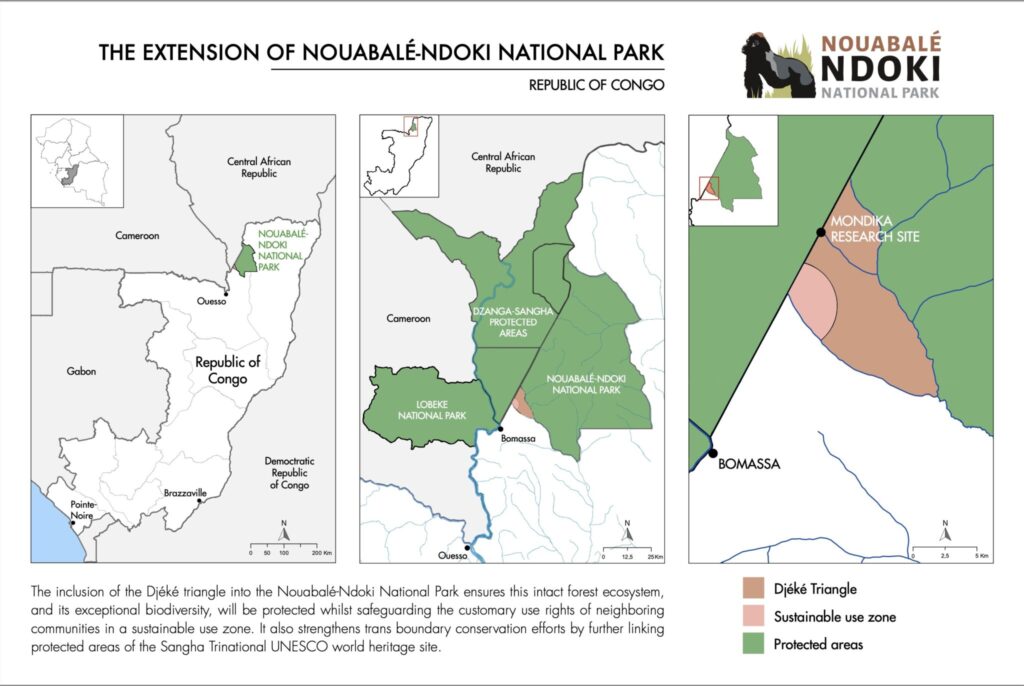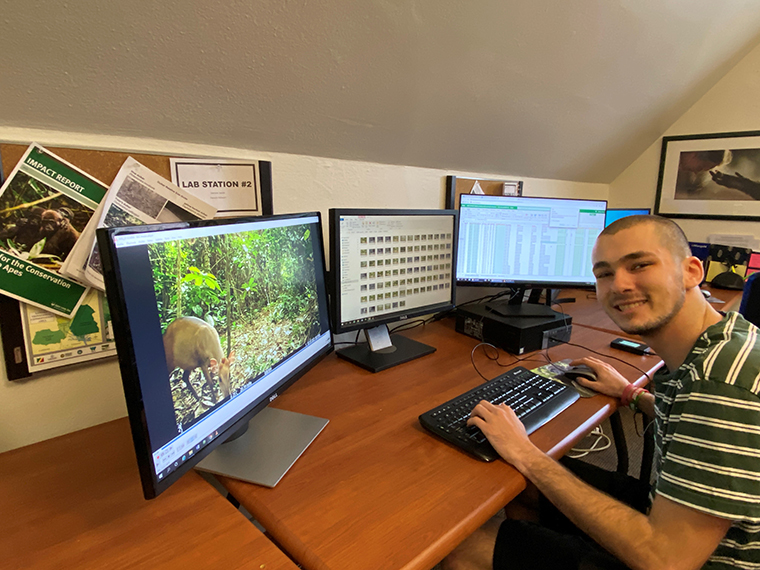Washington University in St. Louis scientists and their international partners have long conducted conservation research in the Republic of Congo, where scientists continue to learn about the great apes and their habitats so that we can better protect them.
This month, the Republic of Congo agreed to protect a 36-square-mile area called Djéké Triangle by making it part of the adjacent Nouabalé-Ndoki National Park - the only habitat in the world home to habituated groups of both gorillas and chimpanzees. The Djéké Triangle is also home to other large mammals such as forest elephants and bongo antelopes, plus more than 300 bird species and 1,000 plant species.
Biodiversity research led by St. Louis scientists helped inform the decision to include the Djéké Triangle in the existing national park.
"The Djéké Triangle is one of the last large areas of intact forest in the region and home to rich biodiversity," said Crickette Sanz, a professor of anthropology in Arts & Sciences at Washington University. Since 1999, the Goualougo Triangle Ape Project, co-directed by Sanz and David Morgan at Lincoln Park Zoo in Chicago, has conducted research and helped provide evidence that this region has high conservation value and deserves legal protection.

"In 2020, we received a Living Earth Collaborative seed grant to gather information to support protection of this area," Sanz said. Collaborators from Washington University, the Saint Louis Zoo and other groups screened thousands of video clips recorded at camera traps to document biodiversity in the Djéké Triangle and used this information to elevate the protected status of the area. The effort was also aimed at improving surveillance in an area that is considered an epicenter of emerging infectious diseases.
At least 20 Washington University graduate and undergraduate students participated in the Living Earth Collaborative effort and the camera trap project, which was supported by the Saint Louis Zoo WildCare Institute Center for Conservation of Congo Apes. These are among the first detailed assessments of species occurrences in the Djéké Triangle, and they have been essential in showcasing the rich biodiversity and high conservation value of this area.

"Stephanie Musgrave (PhD '19) and graduate student Jake Funkhouser created a digital reference guide and training videos to improve protocols for screening videos of wildlife," Sanz said. "Emma Claisse, a sophomore who is the founder of the WashU Bird Club, has been identifying all of the birds in the camera trap videos from the Djéké Triangle. Yaacov Broidy, who is graduating in May with a major in psychological and brain sciences and minors in anthropology and linguistics, has become an expert in duiker classifications…and that is not an easy task!"
But a big draw for the Djéké Triangle area remains the large populations of western lowland gorillas.
"There are currently four groups of gorillas that we study in the area," said Sanz, who co-directs research at the world's longest-running gorilla research site, Mondika, in the Djéké Triangle, with support from the Wildlife Conservation Society and the Lincoln Park Zoo. "Former and current Washington University graduate students, including Kristena Cooksey (PhD '22), Phil McElmurray and Katie Judson, have conducted field research on these groups for their doctoral research."
The tremendous field efforts to conduct transect surveys and place camera traps throughout these remote forests were led by Crepin Eyana, Wen Mayoukou and Claude Abedine, who are now leading landscape-scale conservation projects, Sanz and Morgan said. Working together with Washington University enabled them to advance with analysis of past surveys in time to contribute to the protection efforts of the Djéké Triangle.
Washington University scientists and their collaborators celebrated the Republic of Congo's Djéké Triangle decision.
"This is a monumental win for great apes, the biodiversity of these pristine forests and for the nearby communities," Morgan said. "Giving the Djéké Triangle national park status will make it possible for local Indigenous people to improve their livelihoods through employment and tourism. Additionally, the act will help preserve the biodiversity of a beautiful, still-intact forest region."






